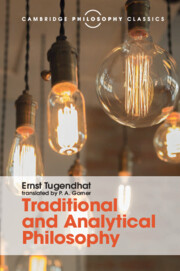Book contents
- Frontmatter
- Dedication
- Contents
- Preface
- Preface
- Translator's preface
- Part I Introduction: confrontation of analytical philosophy with traditional conceptions of philosophy
- 1 A question of method
- 2 A philosopher in search of a conception of philosophy
- 3 Ontology and semantics
- 4 Has formal semantics a fundamental question?
- 5 Consciousness and speech
- 6 The argument with the philosophy of consciousness continued
- 7 A practical conception of philosophy
- Part II A first step: analysis of the predicative sentence
- Bibliography
- Index of names
- Index of subjects
1 - A question of method
from Part I - Introduction: confrontation of analytical philosophy with traditional conceptions of philosophy
Published online by Cambridge University Press: 05 August 2016
- Frontmatter
- Dedication
- Contents
- Preface
- Preface
- Translator's preface
- Part I Introduction: confrontation of analytical philosophy with traditional conceptions of philosophy
- 1 A question of method
- 2 A philosopher in search of a conception of philosophy
- 3 Ontology and semantics
- 4 Has formal semantics a fundamental question?
- 5 Consciousness and speech
- 6 The argument with the philosophy of consciousness continued
- 7 A practical conception of philosophy
- Part II A first step: analysis of the predicative sentence
- Bibliography
- Index of names
- Index of subjects
Summary
‘Introduction to language-analytical philosophy’ – that is ambiguous. From a lecture-course with this title one might expect a survey of a philosophical movement, an historical or systematic guide to the philosophical literature commonly called language-analytical. This is not what I shall be doing, particularly as such introductions to language-analytical philosophy already exist. The title can also be interpreted in another sense, by understanding ‘philosophy’ in the sense of philosophical activity. The title would then denote an introduction to language-analytical philosophizing.
One introduces someone to a particular activity by demonstrating it to him by means of an example, so that he can imitate it. So I would have to demonstrate to you a characteristic language-analytical line of thought in a way that would enable you to follow it and stimulate you to carry out similar patterns of argument yourself. And indeed this is something I intend to do. But such a demonstration by means of an example cannot, taken by itself, suffice for an introduction if the activity in question is a way of doing philosophy.
A way of doing philosophy is not related to other ways of doing philosophy in the way that one form of dance is related to other forms. Forms of dance are not mutually exclusive or inclusive. On the same evening one can, with equal enthusiasm, dance a tango, a boogie and a rock'n'roll – and simply not bother with the waltz. But one cannot philosophize in one way without having rejected or incorporated the others. A dance can be out of date; but it is not on that account incorrect. In philosophy, on the other hand, as in every science, the concern is with truth. For this reason, although ways of doing philosophy can be modern or old-fashioned, worrying about this is the business not of the philosopher but of the historian. If I am asked why I do philosophy in this way rather than that I cannot answer: ‘Because it is up to date’, but only: ‘Because it is the correct way.’ But this implies an obligation to justify the claim to be correct. To introduce someone to a way of doing philosophy, therefore, involves relating it to other ways of doing philosophy and, by means of such a confrontation, demonstrating its correctness.
- Type
- Chapter
- Information
- Traditional and Analytical PhilosophyLectures on the Philosophy of Language, pp. 3 - 11Publisher: Cambridge University PressPrint publication year: 2016

